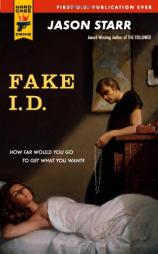Fake I.D.
Review
Fake I.D.
Jason Starr is the link between Richard Prather and Albert Camus. His work is compellingly readable, his characterization frighteningly deep. While one does not pick up and begin a Starr novel without finishing it in one reading, often in a single afternoon, paragraphs and individuals resonate and linger for days, weeks, months and beyond. His characters and their situations are infused with a real-world viability, a world of bad choices leading to worse acts that result in disastrous consequences. It is impossible to predict what will happen as Starr sends them into head-on collisions with each other, collisions that are anything but accidental.
Starr has just published FAKE I.D. through Hard Case Crime, a perfect pairing for both the book and the publisher. This is actually his third novel, written in 2000 but just seeing its U.S. publication in 2009. The erstwhile protagonist is Tommy Russo, who narrates the story from its beginning to its almost preordained ending. This narrative viewpoint is especially appropriate because Russo is most definitely the center of his own universe, a cold practitioner of situational ethics whose actions are informed by the cold justification of whatever form necessity might take. Russo is in his early 30s working as a bouncer in a fairly popular Manhattan bar. He sees himself as an actor who almost had a shot at stardom and who is marking time until his next big break.
A pivotal scene features Russo attending an audition for a commercial; Starr’s description of the event, from the narrator’s point of view, is by turns revealing, informative, heartbreaking and chilling, all within the space of a few paragraphs. It’s not a major event, in the sense that the world is going to keep turning and the sun will come up tomorrow, but you can sense that it was almost predestined. Russo is also addicted to gambling, and his pursuit of the big win (or even a minor one) is chilling in its single-mindedness. Even though Russo is a thoroughly unlikable character, one can’t help but scream at him as he makes what is obviously bad move after bad move. There is a tragedy here, given that Russo is possessed of an animal magnetism that is appealing to the women who are unfortunate enough to be attracted to him. Furthermore, he is blessed with some marketable and useful skills, including an uncanny knack for mathematics and for teaching.
These talents, exhibited briefly in the book, make one wonder if, with a bit of a nudge here or a diversion there early in life, Russo could have been something, or someone, else. But such a possibility seems doubtful. For Russo is more than a gambling addict; he is a sociopath who is capable of doing literally anything to get what he wants. It is ultimately Russo’s gambling addiction that sets up the motivation behind the events of FAKE I.D. At the track, Russo runs into a distant acquaintance who offers him a spot in a syndicate interested in purchasing a racehorse. The price for a chair at the table is far beyond Russo’s means; in order to get the money quickly, he betrays literally everyone who shows him friendship or kindness. While not really surprising, what is chilling is Russo’s matter-of-fact rationalization of his actions --- or, more accurately, his seeming lack of need for justification at all. This is made all the more fascinating by his incredulous reactions on those occasions when he in turn is victimized or betrayed. He is so lacking in insight as to be a blank slate, so much so that, when the bad end finally occurs, he remains in cheerful denial.
It’s almost impossible to do FAKE I.D. its proper justice other than to tell you that you need to read this book before today’s sun sets. If you’ve read Starr before, I’m preaching to the choir. If not, prepare to be introduced to a master.
Reviewed by Joe Hartlaub on January 21, 2011





